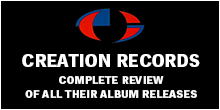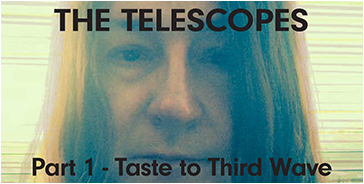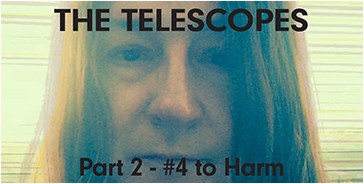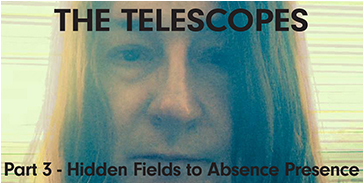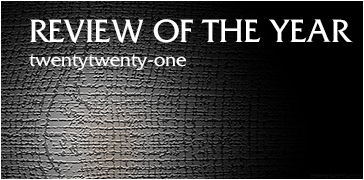
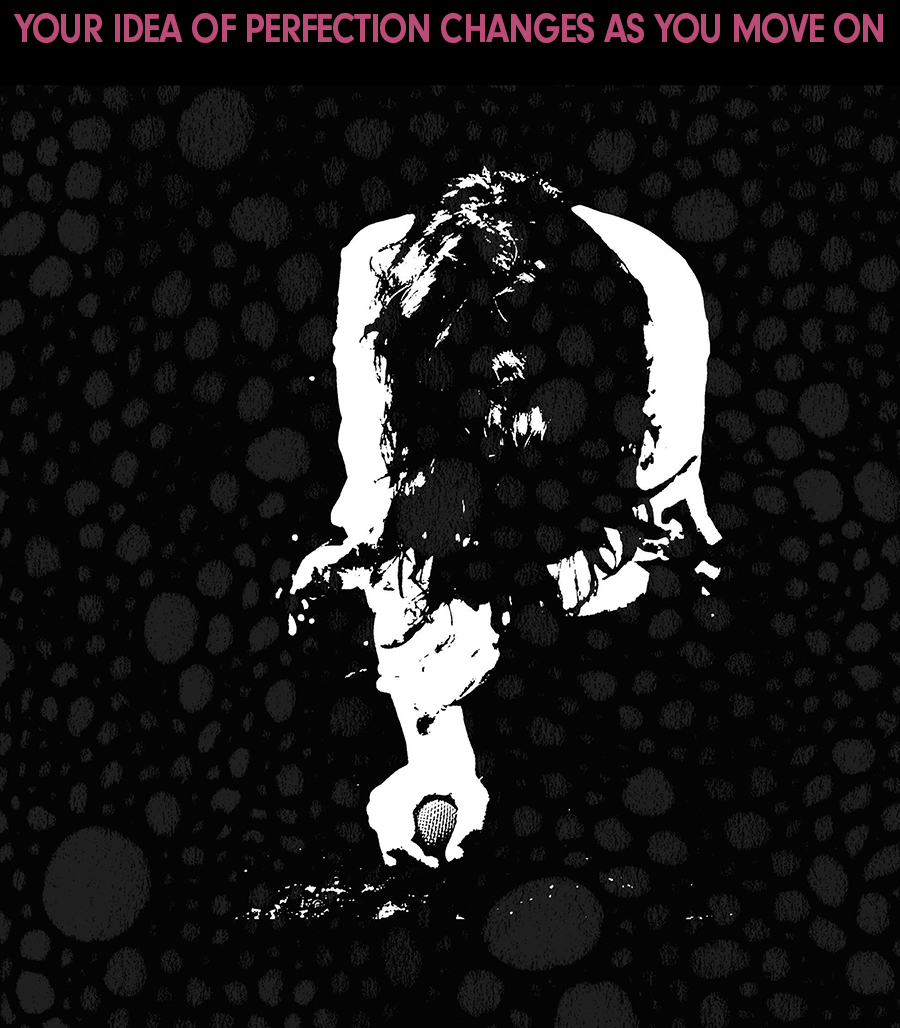
PART TWO of our interview with Stephen Lawrie of The Telescopes where he discusses his work from #4 to Harm.
If Third Wave was The Telescopes’ electronic album, they didn’t linger in that territory for long and the next album #4 set off in another new direction, being the first in which Stephen Lawrie used improvisation as well as pre-written material. Two albums were recorded in this way before he gained the confidence to let go entirely and record two purely improvised works. Three years had passed since Third Wave and Lawrie’s need to experiment was no less prominent with the ten tracks on #4 all treading on the boundaries of musical expression. Everything and anything was used to create the right sounds, with Lawrie credited as utilising an "old leather sofa played with mallets" and a "metal dustbin lid with soft mallets." Other musicians involved in the project added "wire brush on cheese grater" and "hand-held battery operated fan."
It was the era of the CD and #4 remains one of the few Telescopes' albums not to be released on vinyl. Hopefully that can rectified in the future. It saw light of day on Antenna Records, a label founded by Lawrie himself, which released some six albums by various acts over the next decade.
Antenna is a label I set up to help other artists, it was never my intention to have a Telescopes release on there but that's how it transpired. I had much more time to dedicate to the label at the beginning, but as things got busier with The Telescopes I didn't have the time to dedicate myself to it in the same way, so it's on hold for now until I decide what to do with it next. I've really enjoyed working on all the projects the label has taken on, all I know is I want to keep it like that, enjoyable and inspiring.

On #4 Lawrie plays with the building bricks of sound: constructing, deconstructing, rearranging and re-rearranging. Despite being composed on already dated analogue synths, the songs here appear multi-dimensional; there are no rules, no restrictions and no guiding paths to follow. Using vocals only where necessary, and most of these repetitive chants, this is not a singalong collection of tunes, but an intense exploration of the limits of sound. Guitars are played the wrong way, raising the question of whether there is a right way. Sometimes what appears to be a song emerges, but quickly fades as Lawrie searches for answers. It’s not a frantic scramble, but almost a meditative inner journey to uncover lost notes. There’s a serenity lying heavily over the whole. It emanates from 'All The Leaves' and lays heavily on 'Singularity', which must number among Lawrie’s best-ever compositions. The song features Randall Nieman of Füxa, who was a big influence at the time, and consists of a scattering of guitar noise on which is laid the gentlest of vocals, a simple piano refrain and a seranade of sombre horns. The mood is carried into 'Fear The Eye Became The Tone' which has funereal grace and the beginning of closing track 'It Bleeds'. The eruption of noise halfway through the closer simply serves to underline that at the heart of The Telescopes you will always find fury and fire.
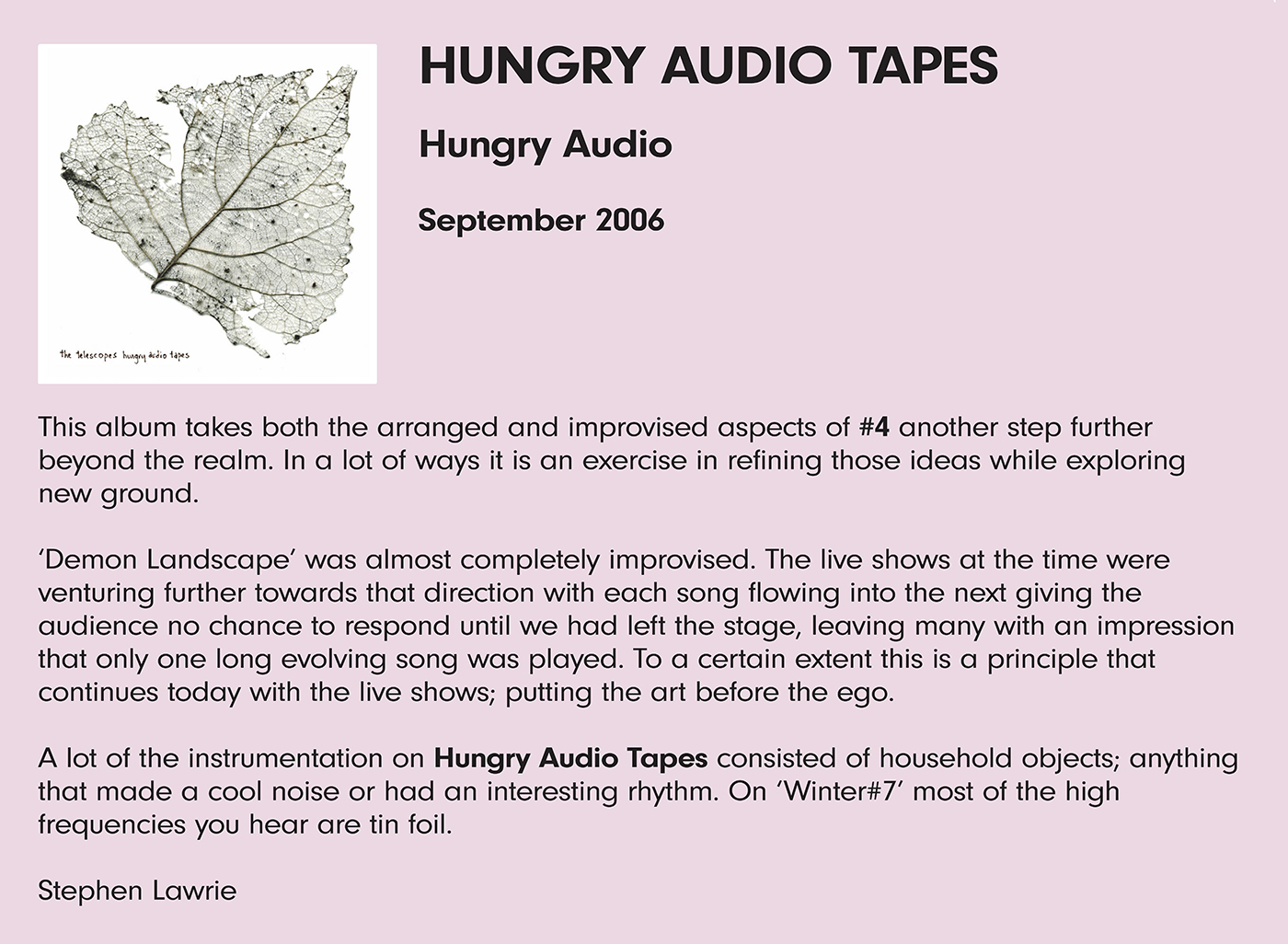
The Hungry Audio Tapes was a joining together of two pieces of music. The Winter EP had been released by Hungry Audio in 2004 and had sold out very quickly. Instead of repressing the seven-inch single to meet demand, the label suggested merging it with Lawrie's latest compositions to form a mini LP. Having listened to the two sets of songs together, Lawrie acknowledged they complemented each other and the project was given the go-ahead.
As with #4, the tracks were a mixture of the pre-written and the improvised with a similar approach taken as with the previous album. The greatest measure of how The Telescopes had progressed was the inclusion of a new version of the band's most famous song, 'The Perfect Needle', with the original words and melody buried so deep you have to strain to recognise them.
I just got into a looser way of writing, moving back and forth around improvisations. I still wrote more traditional songs during that period, some of the songs on Stone Tape and As Light Return were written then, but my interest at the time lay in almost disguising the songs, as ghosts or half-heard imaginings, to the point where in some records the songs became completely imaginary. It’s a different way of listening that is present in a lot of good music of all genres.
The whole sound of The Hungry Audio Tapes is more purposeful and assured than on its predecessor. While Lawrie may be experimenting still, there appears to be more of a plan in his approach. It is all about mechanics to the fore and melody to the back as the songs are submerged into the depths from which their cries can barely be heard. This forces the listener to dive deep into the music to gather whatever they can grab hold of, whether the barest hint of a voice or a suffocated chord. On the surface floats the debris: the noises, whirrs and beats that battle to drag your attention away from the treasures below. It’s cleverly done and ruthlessly effective.
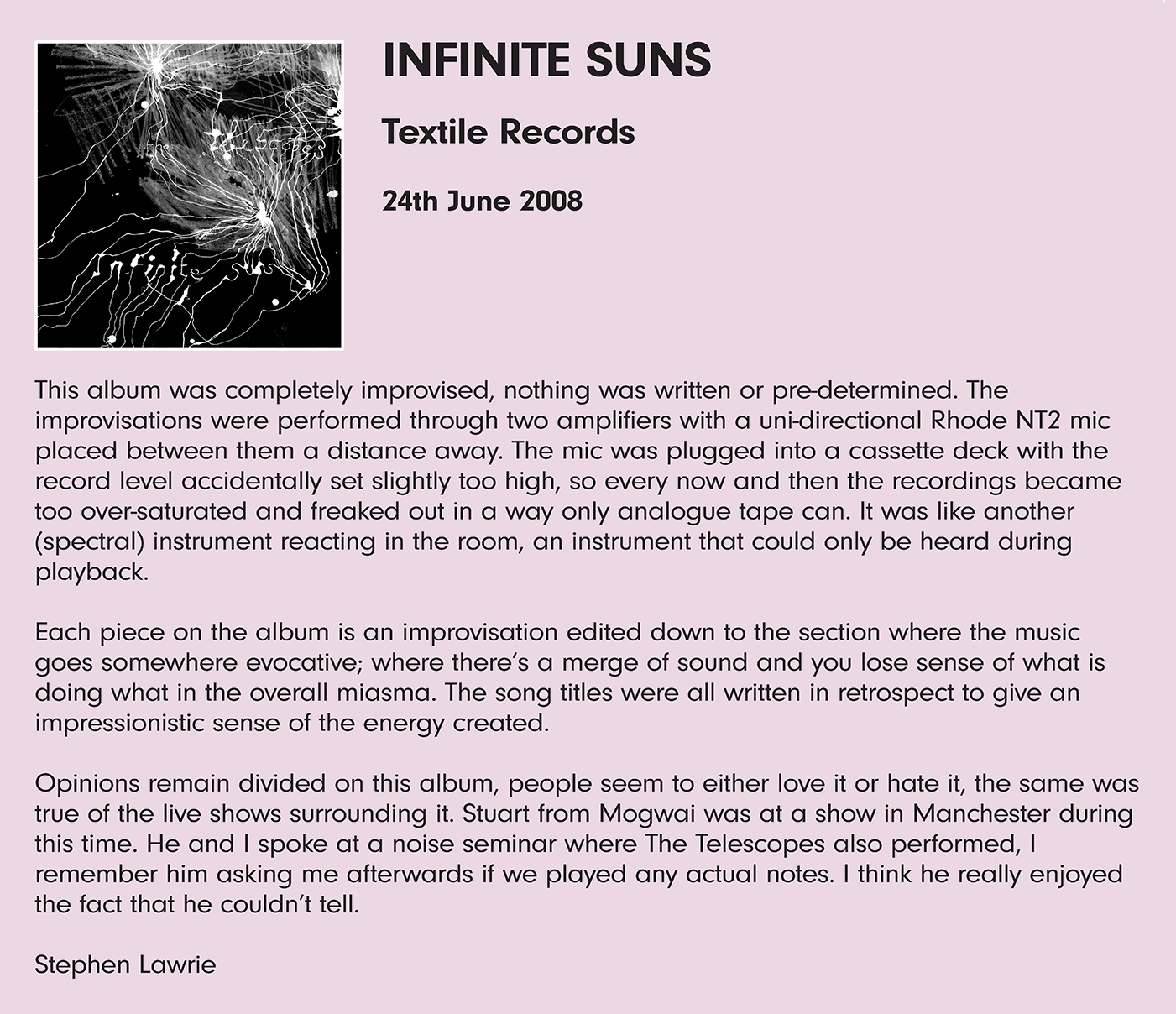
After two CD-only albums, Infinite Suns was pressed on vinyl by French label Textile Records less than two years after The Hungry Audio Tapes was released. In the interim The Telescopes had recorded three singles for the sadly-missed Irish label Trensmat as well as the Auditory Illusions EP for Double Agent in 2006. Infinite Suns is one of the more difficult of The Telescopes’ works to find these days, though all of the band’s releases are available as downloads on Bandcamp.
The album is credited to The Telescopes but described as a "collaboration between Bridget Hayden (Vibracathedral Orchestra) and founder member Stephen Lawrie", with its five tracks co-written. It’s probably the hardest listen of all of the band’s albums, on a par with Lou Reed’s Metal Machine Music.
The sounds the duo create are fractured and abrasive; the music howls and tears at your senses. There’s a certain hypnotic charm to it all, or at least a peace you can find after your senses have been sufficiently numbed, where you begin to notice changes in tone and pace or nod to the occasional faint knocking which pretends to be rhythm. You may discern a tune in 'Northumberland', but you wonder whether your brain has begun to manufacture one of its own after twenty minutes of discord. After a punishing three tracks, the second side of the album feels a little more coherent, but a little more annoyed and confrontational. Or maybe that is the mind at work again. Infinite Suns is extreme in conception and in the way it was recorded, with the music at times cutting out when saturation point has been reached. Clearly the only limits are technical. And the endurance of the listener.

Live. Aftertaste features recordings from February 2010 with Lawrie performing at Oxford’s Cellar Club with London-based experimental outfit, One Unique Signal. Lawrie features on vocals and is joined by three guitars, bass and drums. Of the six tracks on the album, five were taken from Taste, with 'Sadness Pale' one of the extra tracks on the The Perfect Needle EP. Being released midway between the band’s two most oblique albums, it is strange to hear old Telescopes' songs being played in the traditional way. It's a fantastic set full of crashing and howling guitars accompanied by waves of feedback. The sound quality is fairly good with Lawrie’s vocals relatively clear of the mayhem. There is no clue on the record as to what is the a-side or the b-side, nor at what speed to play it, which is splendid.
Reviews of Aftertaste at the time revelled in the respect once more being shown to Taste and were eagerly anticipating The Telescopes' new album. If the writers thought it was going to mark a return to the band's early sound, they were going to be severely disappointed.
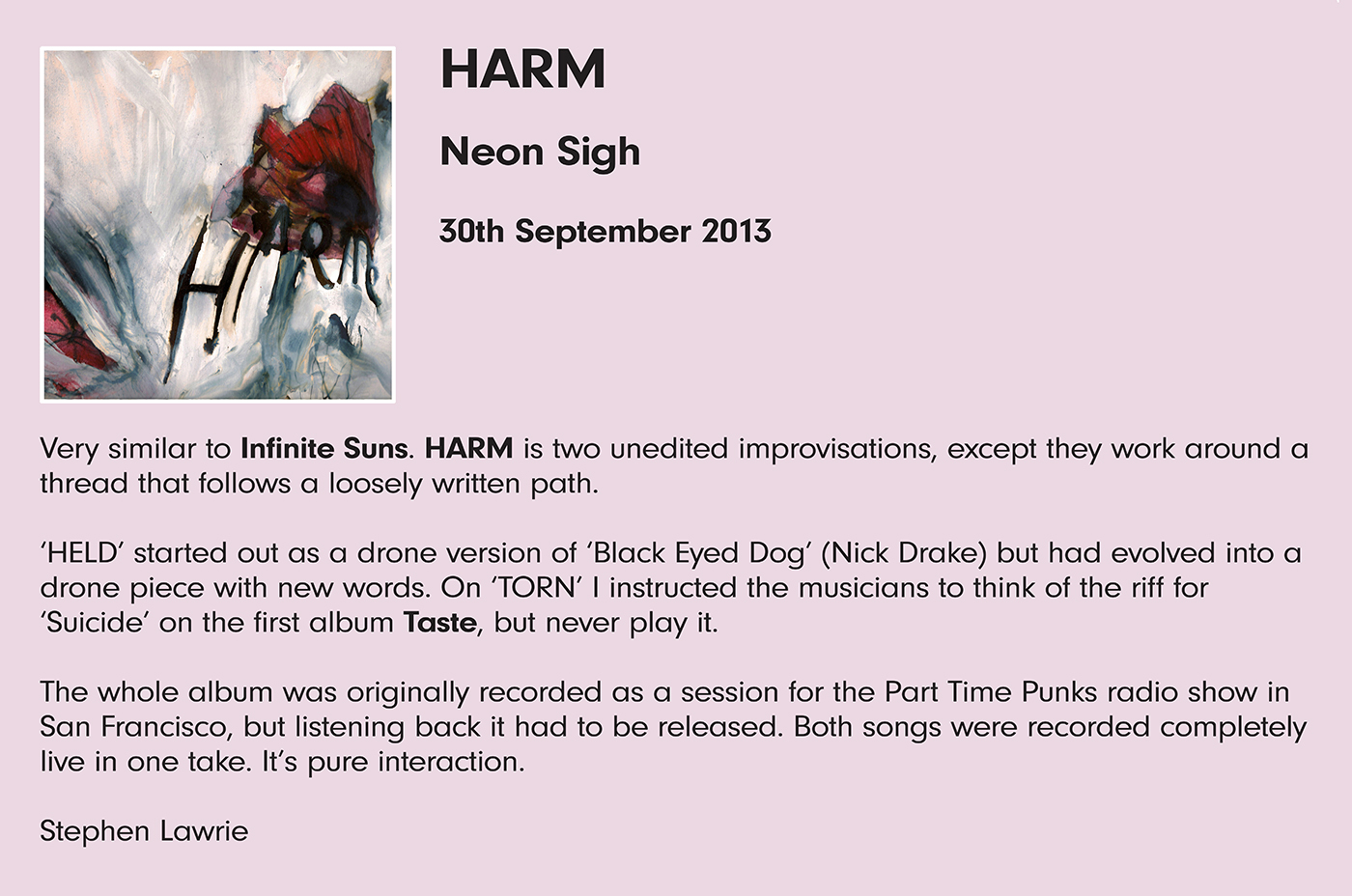
There was a five-year gap between Infinite Suns and Harm during which time Lawrie began to familiarise himself with the group dynamic once again. The new album was to see contributions from guitarist Ricky Maymi of The Brian Jonestown Massacre, and Sonya Trejo, Chris Fifield, Jeff Lee and Andy Liszt from LSD And The Search For God. The whole album was recorded in one take, without any overdubs and with all of the instruments tuned to 444 Hz. This is a change from the universally accepted 440 Hz with the alternative tuning said to "open doors that no man can open," being in harmony with nature and emotionally uplifting.
Between Infinite Suns and Harm I was getting back to playing with bands. As well as releasing the Aftertaste live LP on my own Static Charge label I also recorded an album with One Unique Signal at Anton Newcombe's studio in Berlin and up in Leeds with Richard Formby. Eventually this will come out on Static Charge; its progress was impeded by a computer crash, but luckily we were eventually able to retrieve the data, but had moved on to other projects in the meanwhile. It's on the to do list of things to finish. There is some really great stuff on there.
Again improvised, Harm is less jagged than its predecessor, instead being weighty and dense. There are only two tracks, with side one consisting of 'Held' and side two of 'Torn'. 'Held' is playing hide and seek with shadows. When they are discovered they just add another layer of darkness to the oppressive drone that smothers all traces of conventional songcraft. The howl of guitars is dulled to leave no cutting edges, just a mass of repressed sound that flows inexorably through the number. This is muted power. Lawrie's vocals dissolve as they leave his mouth, the remnants of his words being dragged down into the morass. Restrained power, but also restraint in every sense of the word.
'Torn' allows more life. The concept behind it is remarkable, with the musicians being asked to keep in mind a song which featured on the debut album Taste, while playing something else. It's an attempt to capture the essence of a song from another time and place, to see if sound can be lifted into another plane of existence. Lawrie’s aim with the band has always been to push at the boundaries to discover if there are any limits.
By definition a telescope is "beyond the realm of natural vision". This is how I see The Telescopes' music, multi-layered, not something you can take in completely on a first listen. It takes a while to hear everything that’s going on.



